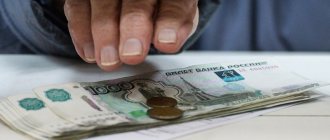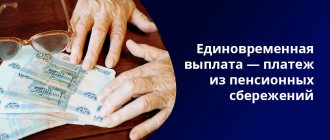What are pension payments
Unfortunately, the money that is assigned by the state cannot always cover a person’s ordinary needs. Therefore, additional payments are provided upon retirement by age. They are permanent or non-permanent; they can be dedicated to a holiday or other occasion.
Important! There is not only an old-age pension, but also payments for the loss of a breadwinner and for disability. The conditions for their purpose are different, as are the order and size.
Who do they rely on?
They can count on:
- people who have reached a certain age;
- citizens who have received disability of 1, 2 or 3 groups;
- persons who have lost their breadwinner.
Additionally, there are social benefits. These are not pensions, but they are used to calling them that. For example, a funeral benefit or additional payments for a set of social services.
Retirement age
In 2021, a new pension reform began, which involves a gradual increase in the retirement age by 2029. Before this reform, ordinary people retired:
- women upon reaching the age of 55 years;
- men upon reaching the age of 60 years.
Important! The increase occurs gradually. Those citizens who were supposed to retire in old age in 2021 will receive the right to payments upon reaching the ages of 55.5 and 60.5, respectively. Previously it was assumed that their age would be increased by a year – 56 and 61, respectively.
For ordinary citizens
For those who retire in 2021 and 2021, preferential transition conditions have been established:
- 2019 – 55.5 and 60.5 years, respectively;
- 2020 – 56.5 and 61.5, respectively.
Further, the age increases annually by 1 year.
For military and government employees
For these categories, the age increase “started” in 2021. The ages were set at 63 and 65 years for women and men. But in connection with the reform, the order was slightly changed. From 2021 there will be an annual increase for 1 year.
The length of service for military personnel varies somewhat. As of 2019, a soldier must serve a minimum of 25 years.
For representatives of working professions with harmful and dangerous professions
For people with “dangerous” and “harmful” professions, a procedure for obtaining a preferential pension is provided:
- men aged 50, if the “harmful” experience is 10 years or more;
- women at 45 years old, if the “harmful” experience is 7.5 years or more.
Important! The condition of having an insurance period of 15 years or more must be met.
Regulatory framework in the field of pensions
If a special law does not provide for certain payments upon retirement from a well-deserved pension, then internal orders, which are approved directly by the employer himself, are fundamental. Such documents have legal force only when there is an improvement in conditions compared to Federal legislation.
Pension reform
Increasing the pension amount by reducing the number of pensioners will take place in stages. This process is January 01, 2021. The required indexations will be calculated directly by the Pension Fund of the Russian Federation. According to Federal Law No. 350-FZ of October 3, 2018, when retiring in old age, certain conditions must be met:
- A gradual increase in the retirement age to 65 years for men and 60 years for women. This threshold must be reached in 2023;
- By 2024, the mandatory insurance period must be increased to 15 years;
- The individual pension capital must be increased to 30 units. This indicator should be achieved by 2025.
The increase in the retirement age by five will also affect teachers and medical workers, people applying for a long-service pension, as well as residents of the Far North and equivalent regions, as well as people living in regions with an unfavorable climate.
Applicants who are eligible to receive a social pension - persons who are not eligible to receive a pension due to insufficient required pension experience or number of points will receive a pension in accordance with the conditions for a gradual increase in the retirement age.
The new law that has entered into force does not bring changes in the area of mandatory additional payments in the event of old-age retirement, but only tightened the employer’s liability when dismissing employees of retirement and pre-retirement age.
Previously, the very fact of dismissing an employee at the initiative of the enterprise administration only upon reaching retirement age was considered discrimination. From January 1, 2021, this norm will also affect pre-retirement people - these persons will be registered for vacation in accordance with the new age qualification rules.
What benefits does a person receive upon retirement?
Various benefits are provided upon retirement. They can be carried out by the state or the enterprise from which the pensioner is retiring. Therefore, the payments are as follows:
- severance pay. Paid in cases provided for by the Labor Code of the Russian Federation. For example, when staffing is reduced;
- wage;
- compensation for vacation that was not used by the pensioner;
- part of the bonus or “thirteenth salary”, if provided for by local regulations;
- one-time payments;
- other payments that may be provided for by federal and regional legislation, depending on the grounds for receiving a pension.
Important! All funds are paid on application basis. Therefore, to appoint them, you must contact the authorized body - the employer, the Pension Fund or the social security office at your place of residence.
Payments from the employer
It is necessary to write a letter of resignation due to retirement. The future pensioner has the right to leave without mandatory 2-week work. But this request also needs to be reflected in the application. It needs to be written like this:
Severance pay
It can be assigned to a future pensioner personally by the employer. For example, an employment or collective agreement may specify the amount of such payment. There is no legal obligation to pay a certain amount of money.
Compensation for unused vacation
What payments are due upon retirement? If the future pensioner did not have time to take his vacation before dismissal, the employer is obliged to pay him this money. The calculation is made based on average earnings and the number of unused days.
Payment must be made on the last working day.
Part of the thirteenth salary
The presence of a “thirteenth salary” is also regulated by the employer. This is his right, not his obligation. But its presence/absence must be regulated by local acts. For example, the Regulations on bonuses.
If these nuances are taken into account, then the employer must make a payment upon dismissal to an old-age pension in proportion to the period of time worked during the calendar year.
Special bonus from the employer
It may also be provided only for some employers and specified in the Regulations. It is paid at the discretion of the management. If there is no regulatory regulation of this issue, then the decision is made solely by management. The size of such a bonus may depend on the “worth” of the retiring employee.
Payments and benefits upon retirement for civil servants
The cash benefits for such workers include:
- additional payments for length of service;
- other allowances.
Civil servants receive additional preferences after they have worked in the relevant position for 20 years or more. This experience must be accumulated by a certain age - 60 and 65 years, respectively. If a pensioner, subject to these conditions, continues to work in his position, for each “exceeding” year he is given an increase of 3%. But he can get no more than 85%.
Pension part
That is, employees of these structures have the right to receive the following funds: the pension part is 45%-85% of the wages that were paid during the last year of service.
The right to purchase free vouchers
If necessary, you can receive free vouchers to a sanatorium or on vacation. To do this, you must contact the authorized body.
Right to free travel
The right to travel free of charge in city and suburban surface and underground transport is also granted upon application. To do this, you need to obtain a special document - a social card.
Undergoing examination and treatment in medical institutions
Each department has its own clinics, clinics and hospitals. Civil service pensioners have the right to undergo examination and treatment in departmental medical institutions.
Reimbursement for relatives for funeral expenses
Another benefit is reimbursement of funeral expenses to close relatives. Not all expenses will be reimbursed, but only the part that is installed in a particular region.
Important! The right to additional preferences and benefits remains even in the event of termination of employment.
Military retirement benefits
Military personnel go on a well-deserved retirement not in a civilian department, but in a military one. The money is paid to them not by the Pension Fund of Russia, but by the Ministry of Defense. The amount of maintenance depends on how many years the soldier served, that is, on his length of service.
Standard payments
A military pensioner will receive:
- 7 salaries in cash if he served for the benefit of the Motherland for more than 20 years;
- 2 salary benefits if you have served for less than 20 years.
There are also additional payments.
Additional payments
An increase may be made to the pension for the following reasons:
- the serviceman has state awards;
- he has incapacitated persons under his care;
- his age has already reached 80 years;
- if he is a participant in the Second World War;
- lived and worked in the Far North or in territories with a similar status.
Important! All additional funds are paid exclusively on an application basis.
Grounds for a lump sum payment of funds to the legal successors of the deceased
A citizen can identify in advance the legal successors of his own pension savings, as well as determine the shares in which the funds will be distributed between them. To indicate legal successors, you need to declare this to the relevant pension fund in which the funded part is located. The application indicates a list of legal successors and their shares are established. If the citizen did not have time to leave such orders, the closest relatives are considered successors.
These include children, including adopted children. Then the successors of the second stage, consisting of brothers, sisters, grandmothers and grandchildren, are considered. The size of the shares of the heirs is determined in equal parts. In the absence of first-degree relatives, second-degree relatives can count on receiving payments. Payments after the death of a citizen are made subject to certain conditions and in a certain order: if the death occurred before the moment they were appointed.
If pension benefits have been awarded, the balance of unpaid funds is paid. If a citizen is accrued a lump sum payment of savings, it can also be received by relatives who lived with him or by disabled citizens who were dependent on the deceased. To receive pension savings, legal successors must contact the relevant pension fund. This must be done within six months. In this case, contacting is possible both in person and at the post office, and you can also use the services of a representative.
Payments from pension savings
Every future potential pensioner has the right to independently save money for their future pension. They can be deposited either in a personal account or in a specially opened pension account.
To use these funds as a pension, 2 conditions must be met simultaneously:
- the right to receive an insurance pension has already arisen, that is, the applicant has reached a certain age;
- these accumulations take place.
Important! In 2021, after the pension reform, payment of pension savings can be made if there are 16.2 pension points and 10 years of service.
Until January 1, 2014, pension savings were made at the expense of employers. Therefore, those citizens who carried out their official work activities before this period were “lucky.” They will have a certain part of their pension, which will be formed from savings. There are other categories of citizens who form these savings. These include:
- those who allocated maternity capital funds to form the funded part of the pension;
- participants of the State Co-financing of Pensions Program.
Payment procedure
If there are no restrictions on the assignment of additional payments, you can apply for them at any time to the Pension Fund at your place of residence. They can be made together with the insurance part of the pension or separately from it. This is the choice and desire of every pensioner.
Determining the amount of payments
To do this, you need to ask for a statement from the account in which pension savings are stored. Then the pensioner has the right to determine for himself how much he will receive monthly.
For ordinary citizens
For example, he plans to live another 20 years after retirement, that is, 240 months. He must divide the entire amount set aside in the form of savings by 240. This will result in his monthly increase in the insurance portion. If he dies earlier, the remaining amount will be inherited by his successors.
For civil servants
There is no such thing as a funded part of a pension for civil servants. Compared to ordinary people, they receive an increased pension. But they have the right to make independent savings with the help of non-state pension funds. After retirement, they can be distributed in a convenient way.
For military personnel
The situation is similar with military personnel. Their pension is formed in a different way than that of civilians. Therefore, there is no savings part. But you can also save money in a non-state pension fund yourself.
Types of payments from pension savings
The following types of payments are distinguished:
- one-time;
- urgent.
One-time payment
Produced at the request of the pensioner. Payout in one amount at a time. To obtain it, certain conditions must be met.
Conditions of receipt
May be paid if:
- the accumulated amount does not exceed the threshold of 5% in relation to the insurance part of the pension;
- The fixed payment is also taken into account.
Persons who have been assigned a disability pension for the loss of a breadwinner can also receive it. But it is necessary that upon reaching retirement age the applicant does not have enough length of service to receive an old-age pension.
Receipt procedure
You need to contact the PRF at your place of residence with an application. Have your passport and SNILS with you.
Urgent payment
This is a payment over a certain period of time. But it cannot be less than 10 years.
Conditions of receipt
You can get it if:
- old age pension age has been reached;
- There are pension savings.
Receipt procedure
You need to contact the PRF at your place of residence with an application. Have your passport and SNILS with you.
Providing funded pension
It is paid every month during the entire pension period along with the insurance part, until death. If any accumulated part remains, the heirs can take it. If the pensioner lives longer than the “survival period,” then the state will pay him extra from its own “pocket.”
From 2021, this period is approximately 21 years, that is, 252 months. A calculation is made from this figure.
Conditions of receipt
The arrival of retirement age and the amount of cash savings is a condition for receiving this part of the pension.
Receipt procedure
You need to contact the PRF at your place of residence with an application. Have your passport and SNILS with you.
Transfer of funds to the heirs of a deceased pensioner
When a person dies, his pension is no longer paid. But now a pension can be issued by inheritance to close relatives. If the deceased had several close relatives and they all have the right to inheritance, then the amount to be paid is distributed into several parts.
Conditions of receipt
To inherit the pension of a deceased person, the following conditions must be met:
- be a close relative of the deceased;
- it is necessary to live with him in the same apartment or other dwelling;
- if the applicant did not live with the deceased, then he can receive a pension if he is declared disabled.
Receipt procedure
It is necessary to contact a notary within six months after the death of a relative and write a corresponding statement. Based on the open inheritance case, the Pension Fund of the Russian Federation will make payments. Have your passport and SNILS with you.
Procedure and conditions for receiving a funded pension at a time in 2021
To register savings savings, certain conditions must be met, the main one of which is reaching the retirement age limit (for 2021: for the female part of the population 55.5 years; for men - 60.5 years).
As soon as the funded pension is issued and assigned, it will be necessary to decide on the type of payment: fixed-term or lifetime. If a citizen is applying for a one-time payment, he will need to ensure that he meets the criteria.
These categories of the population may include people who:
- reaching the age limit corresponding to retirement age in the absence of the required number of pension points and length of service;
- payment of benefits in case of loss of a breadwinner in case of insufficiency of the required length of service;
- accumulated savings in the amount of less than 5% of the insurance pension.
What does the law say?
The list of persons entitled to the right, conditions, terms and procedure for payment, and much more related to the funded pension is established by regulations: Federal Law No. 167-FZ, Federal Law No. 424-FZ, resolutions No. 1047 and No. 1048 (dated December 21, 2009). ). Due to numerous changes, you can familiarize yourself with the current editions on the legal systems.
Who is entitled to
According to the law, any citizen of the Russian Federation, as well as foreign citizens, has the right to create savings savings. However, in order to assign a funded pension, certain conditions must be met, which apply to certain categories of citizens:
- who have carried out work activities since 1967, taking into account that savings began to be formed at the expense of the employer (6% of the employee’s salary) until 2015.
- who made deductions in the amount of 2% of wages in the period from 2002 to 2004. Years of birth are: for men - 1953-1966, for women - 1957-1966.
- who are members of the Co-financing Program (deduction of funds from the state and citizen in a ratio of 1 to 1).
- who used family capital to create savings.
Required documents
In order to apply for a pension, both state and non-state insurance organizations must have copies and originals of the following documents:
- statement of appointment (a second copy to mark receipt to track the review process);
- Russian Federation citizen certificate;
- insurance certificate;
- documents confirming periods of employment (labor or contracts).
If company employees have questions, additional official information and documents may be required.
Where to contact?
According to the law, each pensioner has the right to independently choose in which organization to create savings savings. This could be either the state Pension Fund or other companies that are not such.
In the case of a non-state pension fund, the funds received are used to create new profitable projects for the organization that bring profit; on the basis of this, the amount of payment for citizens is subsequently formed. Accordingly, the size of the funded pension is higher in comparison with the Pension Fund.
If funds are kept in the Pension Fund, then to make an appointment you should visit the branch of the organization at your place of residence with a package of all the required documents, and it is also possible to send it by post with registered notice.
Recently, the Multifunctional Center has become the most popular, which is also a point for accepting applications for payments.
Deadlines for receiving the lump sum funded part of the pension
The submitted application (appropriate form) for registration of the funded part is considered by employees within 10 days from the date of acceptance with a package of all required documents. If at least one is missing, a time period ( 3 months ) is allocated to provide the missing documents.
Based on positive results of consideration of the application, cash payments will be transferred within 2 months .
Legislative regulation in the field of pension payments
Pension payments, the procedure for their assignment and payments are regulated at the federal level. Regional authorities can make additional payments to their pensioners. But this must be regulated by local authorities and legislation.
At the federal level, there is Law No. 173-FZ, which prescribes all the basic principles in the field of pension payments both for ordinary citizens and for some “narrow” categories of workers. In particular:
- for civil servants. It is also worth paying attention to Law No. 350-FZ;
- for military personnel. Pension payments to this category are accrued by the Ministry of Defense, but the basic principles are spelled out in Law No. 173-FZ. It is also worth paying attention to Resolution of the RF Armed Forces No. 4202-1 and the Russian Ministry of Defense No. 2700 dated December 30, 2011;
- other employees.
Important! The old-age pension begins to accrue only after reaching a certain age. If a person has the right to early retirement, he must prove it.
Pensions of military personnel and employees of the Ministry of Internal Affairs
All one-time compensation payments to these persons in the event of their retirement are established by special acts and decrees. By Decree of the Armed Forces No. 4202-1, as amended on November 28, 2015, as well as by Order of the Russian Ministry of Defense No. 2700 dated December 30, 2011, the lump sum benefit directly depends on length of service:
- Seven monthly salaries upon dismissal if the length of service exceeds 20 years;
- Two salaries if length of service is less than 20 years;
- There are established payments when an employee receives government awards from Russia and the USSR;
There is also provision for the payment of benefits of up to 2 million rubles in case of injury and the impossibility of further service due to medical indications. If a medical examination has established a disability, the funds allocated to pensioners are increased by a certain coefficient, depending on the degree of disability.
Features of accrual and calculation of pension payments
Basically, pensions under Law No. 173-FZ are awarded to citizens who carried out their working activities in commercial structures. Reaching a certain age and receiving a pension does not require a person to leave work. Although now he can do this at any time, without working the required 2 weeks.
In addition, a person's pension:
- not subject to income tax;
- insurance premiums are not charged or paid from it;
- if the pensioner continues to work, then these payments can be included in the expenses of the wage fund, which are taken into account when calculating the corporate income tax. They reduce the tax base.
If an employee receives an additional disability pension, upon reaching a certain age he will have the right to an old-age pension. In addition, upon dismissal from an enterprise, a pensioner may have the right to receive severance pay.










